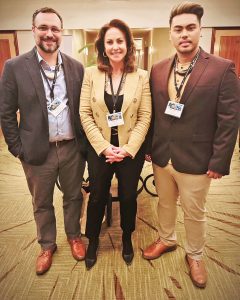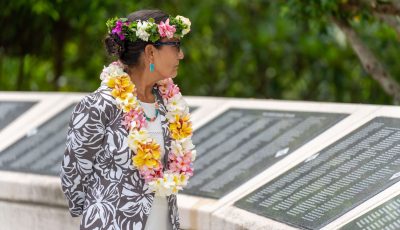CNMI leads the way for Pacific representation at nat’l conference

From left, Leo Pangelinan, Northern Marianas Humanities Council executive director; Tracy Guerrero, NMHC board member; and Dr. Bobby Cruz, NMHC board chair, comprised the NMHC delegation to the 2022 National Humanities Conference early this November and were the presenters of the well-attended session, Fakmåta. (CONTRIBUTED PHOTO)
The Northern Marianas Humanities Council proudly represented the CNMI at this year’s National Humanities Conference in Los Angeles, California last Nov. 10 to 13 and was the only Pacific Island council that not only participated in the event but also held three sessions, further enhancing Pacific islands representation at the conference.
The CNMI’s delegation was led by the council’s executive director, Leo Pangelinan; council chair Dr. Bobby Cruz, and board members Tracy Guerrero and Lynette Villagomez and NMHC staff Maggie Sablan and Naomi Tudela.
Several Pacific Islands also participated in the event, but what made the CNMI stick ou, was that, in addition to participating, the team facilitated three sessions, bringing more voice and visibility to the Marianas.
Their first session was Fakmåta: The Awakening of Pacific Islander Perspectives on the Impact of Colonization on Culture. The session was the most well attended session of the conference, drawing an audience estimated at around 200 individuals. Guerrero, Pangelinan and Cruz led the session, which grappled with the history of colonization in the Marianas and its impact on Chamorro culture and identity.
Cruz explained to Saipan Tribune that they sought to bring understanding to the historical trauma catalyzed by a succession of colonial occupations in the CNMI, from the Spanish to the Germans to the Japanese and the American periods of influence.
“Tracy, Leo, and I did this to spark discourse and push for greater representation for our people. We wanted to revisit events in our history through the eyes of our Chamorro ancestors, i saina-ta, i tåotåomo’na, i manmofo’na, as much of our history is told through the biased lens of those who colonized us,” Cruz said. “We started with the questions: Who are we, and what happened to our people? Håyi hit, yan håfa ma susedi ni tåotåo-ta? Unpacking our historical trauma caused by colonization is hard, but when we face it, we can begin to heal and move from a position of victimization to empowerment.”
After the conclusion of their session, Cruz said many approached them to thank them, with some in the audience moved to tears by the presentation.
“It was so powerful to hear that our work inspired so many scholars and historians and taught them something new. It was an important project for us because it allowed us to reflect on our own personal awakening to the impact of our colonial past as descendants of the indigenous people of the Marianas,” Guerrero said.
Pangelinan said that talking to the outside world “about who we are as a people has helped deepen my understanding of my personal relationship to our Chamorro cultural heritage.”
Cruz told Saipan Tribune that this is just the start of more representation. “Our people of the Marianas have more lessons to share with the world. We also have our indigenous Carolinian brothers and sisters, i manelu-ta, who, while we now stand as one indigenous people, historically have their powerful truths that the world needs to hear about. So, our participation this year is only the story’s beginning of more representation in spaces at that level.”
The council also showcased its film project, Island Time, as presented by director Sophia Perez, with a teaser from the film that allowed the audience to ask questions.
“Island Time is a Sesame Street-style children’s show pilot that the council is producing as an educational tool meant to help teach CNMI history and culture as well as the Chamorro language,” said Perez. “It was a fun, creative project done with our local community members to promote positivity and local values and reach kids where they are.”
The council also helped facilitate collaboration across state and jurisdictional councils in a session titled “Movement across Oceans, Toward Justice,” working with Humanities Guåhan in partnership with Oregon Humanities in a roundtable session to discuss the “kinetic energy” of a collaborative project that involves movement across the Pacific striving toward justice. The session’s goal is to explore this partnership’s process and content and how it illuminates the way humanities perspectives and approaches can imagine and re-imagine more just, inclusive, and sustainable communities.
The team also met with Shelly Lowe, chair of the National Endowment for the Humanities, to discuss the CNMI needs and witnessed the election of Pangelinan to the board of directors of the Federation of State Humanities Council.
“Leo is an extraordinary human being and leader. His election is a monumental event that inevitably would mean great advocacy at the national level. Leo is also the first person of indigenous Chamorro descent to serve on that body. I am very proud,” said Cruz.
The National Humanities Conference gathers humanities leaders from state and federal levels, as well as leading scholars and historians throughout the United States and its territories. The NHC’s 2022 theme was “Energy of Motion: Experiencing Change in Kinetic California.”



























